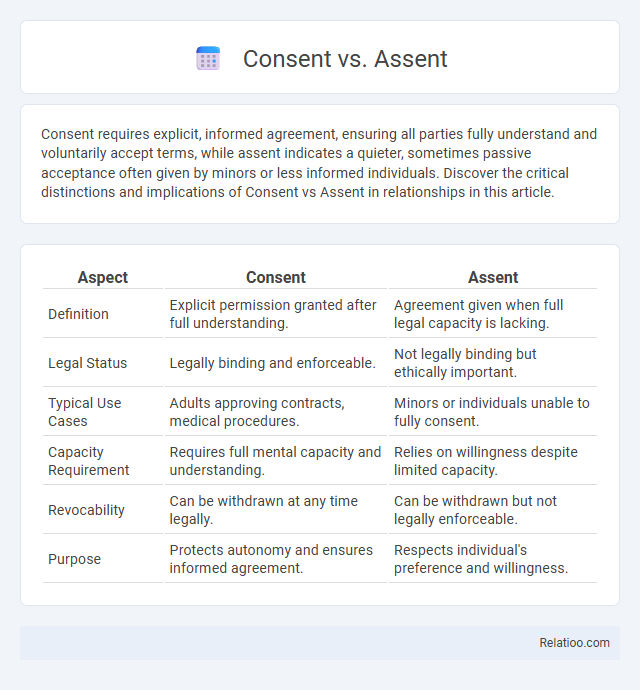Consent requires explicit, informed agreement, ensuring all parties fully understand and voluntarily accept terms, while assent indicates a quieter, sometimes passive acceptance often given by minors or less informed individuals. Discover the critical distinctions and implications of Consent vs Assent in relationships in this article.
Table of Comparison
| Aspect | Consent | Assent |
|---|---|---|
| Definition | Explicit permission granted after full understanding. | Agreement given when full legal capacity is lacking. |
| Legal Status | Legally binding and enforceable. | Not legally binding but ethically important. |
| Typical Use Cases | Adults approving contracts, medical procedures. | Minors or individuals unable to fully consent. |
| Capacity Requirement | Requires full mental capacity and understanding. | Relies on willingness despite limited capacity. |
| Revocability | Can be withdrawn at any time legally. | Can be withdrawn but not legally enforceable. |
| Purpose | Protects autonomy and ensures informed agreement. | Respects individual's preference and willingness. |
Understanding Consent and Assent
Understanding consent involves obtaining explicit permission for a specific action, ensuring that You are fully informed and agree willingly. Assent refers to a minor or an individual unable to provide legal consent expressing agreement to participate, often used alongside consent from a legal guardian. Clear differentiation between consent and assent is crucial in ethical practices, especially in healthcare and research settings, to respect autonomy and legal requirements.
Defining Consent: Legal and Ethical Dimensions
Consent involves a clear, voluntary agreement by an individual with full capacity and understanding, serving as a fundamental legal and ethical requirement in medical and research contexts. It ensures Your autonomy is respected by requiring explicit permission before any intervention, differentiating it from assent, which is a lesser agreement usually sought from minors or individuals lacking full legal capacity. Ethical frameworks emphasize that valid consent must be informed, meaning it includes comprehensive disclosure of risks, benefits, and alternatives, safeguarding individuals' rights and promoting trust in professional relationships.
What is Assent? An Overview
Assent refers to a minor's or individual's affirmative agreement to participate in research, acknowledging their willingness without the legal capacity to provide full consent. It is distinct from consent, which is legally binding and given by someone with the authority to make decisions, such as a parent or guardian in the case of minors. Your understanding of assent ensures ethical compliance and respects the participant's developing autonomy in medical or research settings.
Key Differences Between Consent and Assent
Consent involves a clear, voluntary agreement given by an individual with full capacity to understand the implications, while assent refers to a positive affirmation from someone, often a minor or person lacking full legal capacity, indicating willingness without full legal authority. You must obtain consent to ensure legal and ethical validity, whereas assent is supplementary, respecting the individual's willingness but not serving as legally binding approval. Key differences include the person's legal capacity, the binding nature of the agreement, and the level of understanding required.
Importance of Age and Capacity in Decision-Making
Age and cognitive capacity play a critical role in distinguishing consent, assent, and informed consent in decision-making processes. Consent requires legal age and sufficient mental capacity to understand the implications, whereas assent involves agreement from individuals, typically minors, who lack full legal capacity but can express willingness. Your ability to make valid decisions hinges on meeting these criteria, ensuring ethical and legal standards are upheld in healthcare, research, and legal contexts.
Legal Requirements: Consent vs. Assent
Consent in legal contexts requires a clear, informed, and voluntary agreement from an individual with full capacity, while assent refers to a minor's affirmative agreement often needed alongside parental or guardian consent. Legal requirements for consent mandate that the individual fully understands the nature and consequences of the decision, which is essential for contracts, medical procedures, and research participation. Assent is considered ethically significant but does not replace consent, serving as a supplementary process to respect the developing autonomy of minors or incapacitated individuals.
The Role of Parents and Guardians
Parents and guardians play a crucial role in providing consent for minors in medical, legal, and research contexts where the individual lacks legal capacity. Assent involves the minor's affirmative agreement alongside parental consent, ensuring respect for the child's developing autonomy and understanding. Clear differentiation between consent (legal authorization by adults) and assent (child's willingness) safeguards ethical standards and legal compliance in decision-making processes involving minors.
Informed Consent in Research and Healthcare
Informed consent in research and healthcare ensures that You receive comprehensive information about procedures, risks, and benefits before agreeing to participate or undergo treatment. Consent is a legally binding agreement, whereas assent reflects a minor's or cognitively impaired person's affirmative agreement without full legal capacity. Clear differentiation between consent and assent protects ethical standards and respects individual autonomy in medical and research settings.
Best Practices for Obtaining Assent
Obtaining assent involves clearly explaining research procedures to minors in age-appropriate language, ensuring they understand the purpose and potential risks before agreeing to participate. Best practices recommend assessing the child's developmental level and respecting their willingness or refusal without coercion, supplementing assent with parental or guardian consent. Emphasizing open communication and ongoing dialogue throughout the study fosters ethical inclusion of minors in research.
Ethical Considerations in Consent and Assent
In ethical considerations, consent involves a fully informed, voluntary agreement by an individual capable of understanding the implications, while assent refers to a child's or incapacitated person's affirmative agreement, which complements but does not replace consent from a legal guardian. Your responsibility in research or medical contexts is to ensure that informed consent is obtained when possible, and assent is sought to respect the autonomy and participation of those unable to legally consent. Ethical guidelines emphasize clear communication, comprehension, and voluntariness to protect participants' rights and welfare.

Infographic: Consent vs Assent
 relatioo.com
relatioo.com